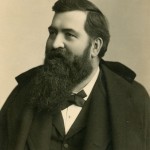As readers of my blog and listeners to my podcast know, I’ve been doing some study of the Pietist movement lately. One of the reasons I began to study this topic is that due to my writing on the subject of good works and sanctification, I have sometimes had the phrase thrown at me. Well, I figured it would be worthwhile to explore the actual historical movement known as Pietism, so that I can interact with such accusations in an informed manner. My contention regarding Pietism has been twofold: First, I contend that we should not use the term as a synonym for “legalism” or for “someone to talks about sanctification too much,” or “everyone who confesses the third use of the law.” Second, I have contended that the movement is often unfairly misrepresented. In many of the discussions I’ve seen among confessional Lutherans, the claim is made that Pietists taught Christian perfectionism. After my study of these issues, I haven’t found that to be the case among any of the mainstream Pietists. That’s a unique doctrine of Wesleyanism.
It’s unfortunate that attempts to deal with different Christian traditions with nuance is somehow treated as a defense of that particular tradition. I’ve been informed by several people over the last few weeks that I am trying to rehabilitate Pietism. This simply is not the case. We, as Christians, need to be concerned with truth. We need to be concerned with accuracy and honesty in our scholarship. We also need to put the best construction on things that we view in church history. I recognize that it’s much easier to put things into neat categories like: All Confessional Lutherans=good. All Pietism=bad. As any historian knows, the world simply doesn’t work this way. The truth is, yes, there were some real issues that Pietism attempted to address. Yes, there were some Pietists that said and did some good things. But on the other hand, there certainly were many issues that arose through Pietism which affected the church negatively. The emphasis on personal conversion led the way to revivalism, and oftentimes sanctification was emphasized to the exclusion of justification. The over-psychologizing of the ordo salutis can also tend to be quite problematic.
I’m not a Pietist. My roots are firmly within Confessional Lutheran Orthodoxy. All of my primary theological influences are scholastic Lutheran theologians, rather than Pietists. Of the Pietists I have read, I have found some major issues that I disagree with. However, we still need to be fair to those Christians with whom we disagree. One might just as soon accuse me of Arminianism (which I have been accused of) because I have continually reminded people that classical Arminian theology and SemiPelagianism are not identical. As Christians, and especially scholars, we have a duty to speak with honesty and integrity. And that means representing other traditions accurately, no matter how much easier it is to simply deal with caricatures.












